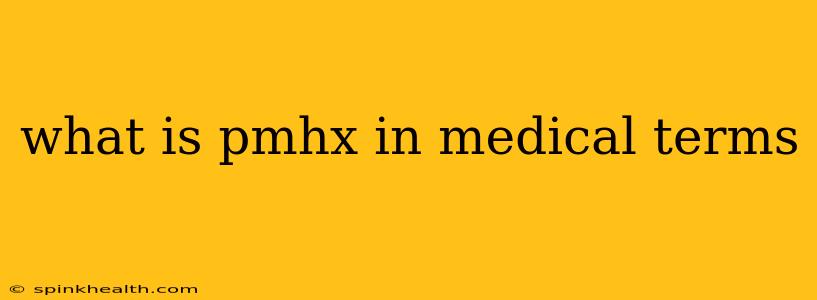What is PMHx in Medical Terms? Unraveling the Mystery of Past Medical History
Have you ever looked at a medical chart and seen the abbreviation "PMHx"? It might look like a cryptic code, but understanding this common medical shorthand is crucial for both patients and healthcare professionals. Let's unravel the mystery together and explore what PMHx truly means.
PMHx stands for Past Medical History. It's a fundamental component of a patient's medical record, providing a concise summary of significant past illnesses, injuries, and treatments. Think of it as a timeline of a person's healthcare journey, highlighting key events that shape their current health status.
Imagine a detective piecing together clues to solve a case. For a doctor, the PMHx is like a crucial piece of evidence, providing context and insights into a patient's present condition. A seemingly minor ailment today might be deeply connected to a past event documented in the PMHx.
Why is PMHx Important?
The PMHx is essential for several reasons:
-
Informed Diagnosis: It helps doctors understand the patient's overall health picture, avoiding misdiagnosis and enabling more accurate assessments. For example, a patient with a history of heart problems will require a different approach compared to a patient with no such history.
-
Tailored Treatment: Treatment plans are significantly influenced by the PMHx. Knowing about previous allergies, surgeries, or responses to medications ensures the doctor chooses the safest and most effective treatment.
-
Risk Assessment: Past medical events can indicate a higher risk for certain conditions. A patient's PMHx might reveal a predisposition to specific diseases, enabling preventive measures.
-
Continuity of Care: The PMHx ensures seamless transitions between healthcare providers. If a patient sees a new doctor, their PMHx helps provide a comprehensive overview of their health journey.
What Information is Included in PMHx?
The information included in a PMHx can vary, but generally encompasses:
-
Significant Illnesses: This includes conditions like diabetes, hypertension (high blood pressure), heart disease, cancer, asthma, and other major health events.
-
Surgeries: Details about past surgical procedures, including dates and types of surgery.
-
Hospitalizations: Records of previous hospital admissions, reasons for admission, and length of stay.
-
Injuries: Details about any significant injuries, such as fractures, burns, or head trauma.
-
Allergies: A complete list of allergies to medications, food, or environmental substances.
-
Medications: A record of past medications, including the names and dosages, and any adverse reactions.
Frequently Asked Questions about PMHx
What if I don't remember all my past medical information?
Don't worry! Your healthcare provider can access your medical records from previous visits or facilities. Try to recall as much information as possible, and your doctor will help fill in the gaps.
How can I access my own PMHx?
Many healthcare systems offer online patient portals where you can access your medical records, including your PMHx. Alternatively, you can request a copy of your records from your healthcare provider's office.
Is PMHx confidential?
Yes, your PMHx, like all medical information, is protected by strict confidentiality laws. Only authorized healthcare professionals involved in your care can access your PMHx.
What if I have a condition I'm embarrassed to share?
It's crucial to be completely honest with your doctor. Withholding information can hinder accurate diagnosis and treatment. Your healthcare provider is there to help you, and maintaining open communication is key to receiving the best care.
In conclusion, PMHx is much more than just an abbreviation; it's a vital piece of the puzzle in understanding a person's health. By actively participating in maintaining and updating your PMHx, you empower yourself and your healthcare team to make informed decisions and achieve the best possible health outcomes.

